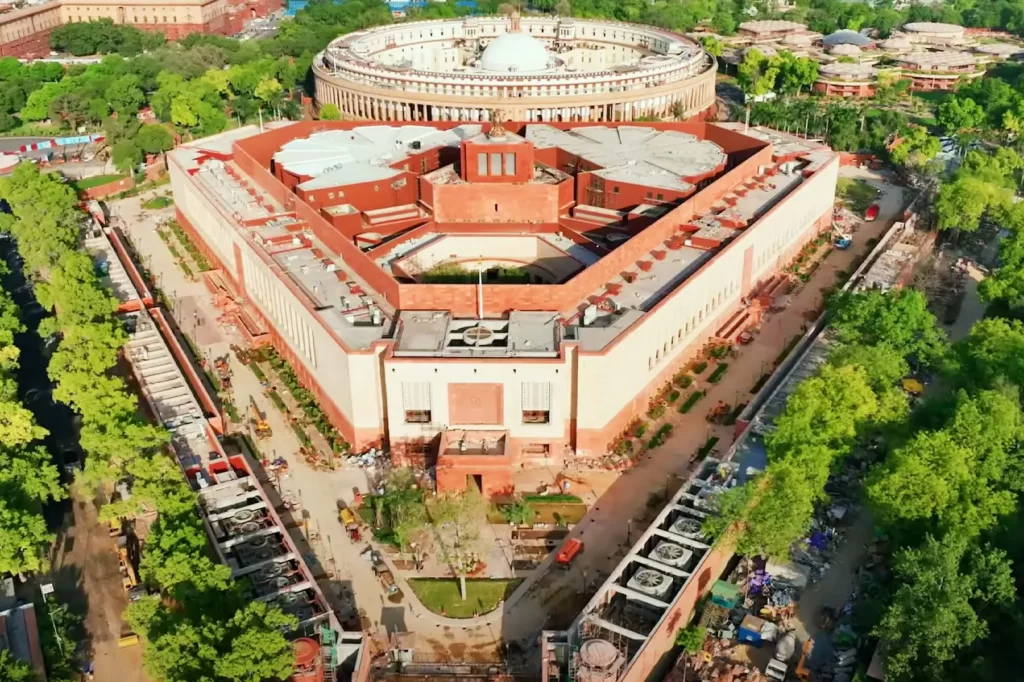The Rajya Sabha witnessed unprecedented drama on December 6, 2024, when a wad of ₹500 currency notes was found under a seat assigned to Congress MP Abhishek Manu Singhvi. The startling revelation by Chairman Jagdeep Dhankhar not only disrupted proceedings but also escalated into a fierce political row between the ruling BJP and the Opposition, bringing the House to a standstill.
Discovery During Anti-Sabotage Check in Rajya Sabha
The incident unfolded during a routine anti-sabotage check in Rajya Sabha conducted after the House adjourned the previous day. Security personnel discovered ₹500 notes, totalling approximately ₹50,000, neatly tucked under seat number 222, allocated to Mr. Singhvi. Chairman Dhankhar, in his address, expressed concern over the find, stating it was his obligation to inform the House. “This is a serious matter, and an investigation has been ordered. It’s unclear if the currency is real or counterfeit,” he noted, adding that the checks were part of heightened security measures.
Singhvi Denounces Allegations
Responding to the accusations in Rajya Sabha, Mr. Singhvi dismissed the episode as “bizarre” and politically motivated. “My total presence in the Rajya Sabha yesterday was three minutes,” he clarified in a statement. “This issue is being politicized unnecessarily. There should be an investigation, but to suggest that I had anything to do with this is outrageous.”
He further emphasized the need for enhanced security protocols, suggesting members be allowed to lock their seats to prevent such occurrences. “If someone can place anything on a seat, it raises serious questions about the security of this institution,” he said.
Opposition Cries Foul
Leader of Opposition in Parliament Mallikarjun Kharge accused the Chairman of prematurely naming Mr. Singhvi before the investigation concluded. “This is not just about Singhvi but about maintaining the dignity of Parliament. The member’s name should not have been disclosed without concrete evidence,” he argued.
Congress MP Imran Masood echoed these sentiments in Rajya Sabha, alleging that the controversy was a ploy to divert attention from the Adani bribery scandal. “This government is using this issue to distract from real concerns. If they are serious, let them conduct a thorough probe. Singhvi is an eminent lawyer—why would he stoop to something so petty?” Masood questioned.
Ruling Party Hits Back
In contrast, BJP leaders seized the opportunity to criticize the Opposition. Leader of the House J.P. Nadda called the incident “an attack on the dignity of the House” and accused the Opposition of hypocrisy. “They stall Parliament over baseless allegations, but when a serious issue like this arises, they try to brush it under the carpet,” he remarked.
Union Minister Kiren Rijiju defended the Chairman’s decision to name the member, insisting that transparency was necessary. “Why object to the Chairman pointing out the seat number and the occupant? Carrying bundles of notes into Parliament is unacceptable,” he said.
Adding fuel to the fire, Union Minister Piyush Goyal suggested a larger conspiracy. “The Opposition has repeatedly stalled the House with fake narratives. Is this another attempt to disrupt proceedings? We need to investigate thoroughly,” he said.
A Divided House
As tempers flared, Deputy Chairman Harivansh struggled to bring order to the House. Attempts to proceed with Zero Hour were thwarted by loud protests from both sides, forcing an adjournment for the day. The acrimony underscored the growing chasm between the treasury and Opposition benches, with each side accusing the other of undermining parliamentary decorum.
Call for Investigation
Despite the political mudslinging, there was near-universal agreement on the need for an impartial investigation. CPI MP P. Santosh Kumar supported the probe but criticized the public naming of Mr. Singhvi. “This should have been handled discreetly within the confines of the Rajya Sabha,” he opined.
BJP MP Manoj Tiwari, meanwhile, expressed shock and demanded a broader inquiry. “This is a temple of democracy. Such incidents tarnish its sanctity. We need to find out how this money got here and who is responsible,” he said.
Broader Implications
The episode raises troubling questions about security lapses within Parliament. If currency notes can be placed unnoticed, it suggests vulnerabilities that could be exploited for far graver threats. Chairman Dhankhar underscored this point, noting that anti-sabotage checks must remain rigorous given modern security challenges.
For now, the incident remains shrouded in mystery. Was it an intentional act to malign a parliamentarian, a careless mistake, or something more sinister? Until the investigation concludes, speculation will dominate discussions both within and outside Parliament.
Political Ramifications
The discovery of the currency notes has added another layer of animosity to an already polarized political landscape. For the BJP, it’s an opportunity to put the Opposition on the defensive, while the Congress views it as a diversionary tactic to avoid addressing issues like the Adani controversy.
As the winter session continues, this incident is likely to remain a flashpoint. Whether it leads to meaningful reforms in parliamentary security or merely deepens the existing divisions remains to be seen. For now, the Rajya Sabha adjourns, leaving behind a trail of questions and controversies.





